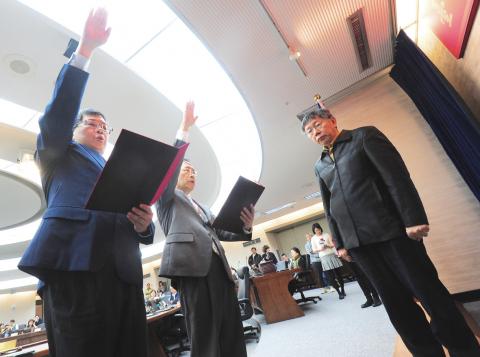Taipei Mayor Ko Wen-je (柯文哲) yesterday administered the oath of office to Tsai Ping-kun (蔡炳坤), who became the third deputy mayor, and Lin Chih-feng (林志?), who was promoted to Taipei Public Works Department commissioner.
Tsai, who became chief executive officer of the Tzu Chi Culture and Communication Foundation in 2016, previously served as principal of Taichung First Senior High School and Taipei Municipal Jianguo High School, and was Taichung deputy mayor under then-Taichung mayor Jason Hu (胡志強) of the Chinese Nationalist Party (KMT) from 2010 to 2015.
The third deputy mayor’s post had been vacant since the start of Ko’s second term on Dec. 25 last year.

Photo: Wang Yi-sung, Taipei Times
Hu’s attendance at the ceremony led to speculation that Ko might cooperate with the KMT or try to attract votes from pan-blue camp supporters if he enters next year’s presidential race.
Asked about the rumors, Tsai said that Hu did not question his political affiliation when he asked him to become Taichung deputy mayor and neither did Ko, adding that since he is not a member of any political party, he could serve everyone.
Ko emphasizes credibility and honesty, efficiency and listening to others, while he believes in love, persistence and efficiency, so he thinks their values match and they could work well together, Tsai said.
While Hu is more humorous, Ko is more rational and straightforward, but Hu’s ample diplomatic experience could help Taipei push its diplomatic efforts and he would be happy to serve as a bridge between Hu and Ko, Tsai said.
He would be supervising the departments of social welfare, education, culture, and information and tourism, among others, and would seek to communicate more with the private sector, Tsai said.
Lin was head of the department’s New Construction Office prior to his promotion.

Alain Robert, known as the "French Spider-Man," praised Alex Honnold as exceptionally well-prepared after the US climber completed a free solo ascent of Taipei 101 yesterday. Robert said Honnold's ascent of the 508m-tall skyscraper in just more than one-and-a-half hours without using safety ropes or equipment was a remarkable achievement. "This is my life," he said in an interview conducted in French, adding that he liked the feeling of being "on the edge of danger." The 63-year-old Frenchman climbed Taipei 101 using ropes in December 2004, taking about four hours to reach the top. On a one-to-10 scale of difficulty, Robert said Taipei 101

Nipah virus infection is to be officially listed as a category 5 notifiable infectious disease in Taiwan in March, while clinical treatment guidelines are being formulated, the Centers for Disease Control (CDC) said yesterday. With Nipah infections being reported in other countries and considering its relatively high fatality rate, the centers on Jan. 16 announced that it would be listed as a notifiable infectious disease to bolster the nation’s systematic early warning system and increase public awareness, the CDC said. Bangladesh reported four fatal cases last year in separate districts, with three linked to raw date palm sap consumption, CDC Epidemic Intelligence

Taiwanese and US defense groups are collaborating to introduce deployable, semi-autonomous manufacturing systems for drones and components in a boost to the nation’s supply chain resilience. Taiwan’s G-Tech Optroelectronics Corp subsidiary GTOC and the US’ Aerkomm Inc on Friday announced an agreement with fellow US-based Firestorm Lab to adopt the latter’s xCell, a technology featuring 3D printers fitted in 6.1m container units. The systems enable aerial platforms and parts to be produced in high volumes from dispersed nodes capable of rapid redeployment, to minimize the risk of enemy strikes and to meet field requirements, they said. Firestorm chief technology officer Ian Muceus said

MORE FALL: An investigation into one of Xi’s key cronies, part of a broader ‘anti-corruption’ drive, indicates that he might have a deep distrust in the military, an expert said China’s latest military purge underscores systemic risks in its shift from collective leadership to sole rule under Chinese President Xi Jinping (習近平), and could disrupt its chain of command and military capabilities, a national security official said yesterday. If decisionmaking within the Chinese Communist Party has become “irrational” under one-man rule, the Taiwan Strait and the regional situation must be approached with extreme caution, given unforeseen risks, they added. The anonymous official made the remarks as China’s Central Military Commission Vice Chairman Zhang Youxia (張又俠) and Joint Staff Department Chief of Staff Liu Zhenli (劉振立) were reportedly being investigated for suspected “serious